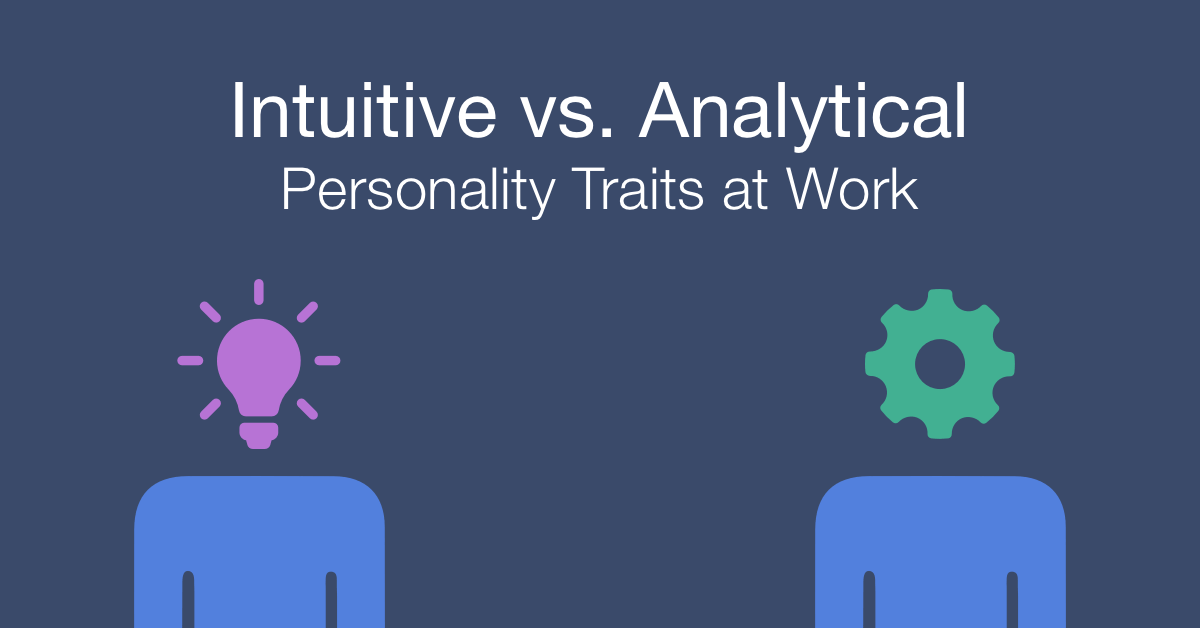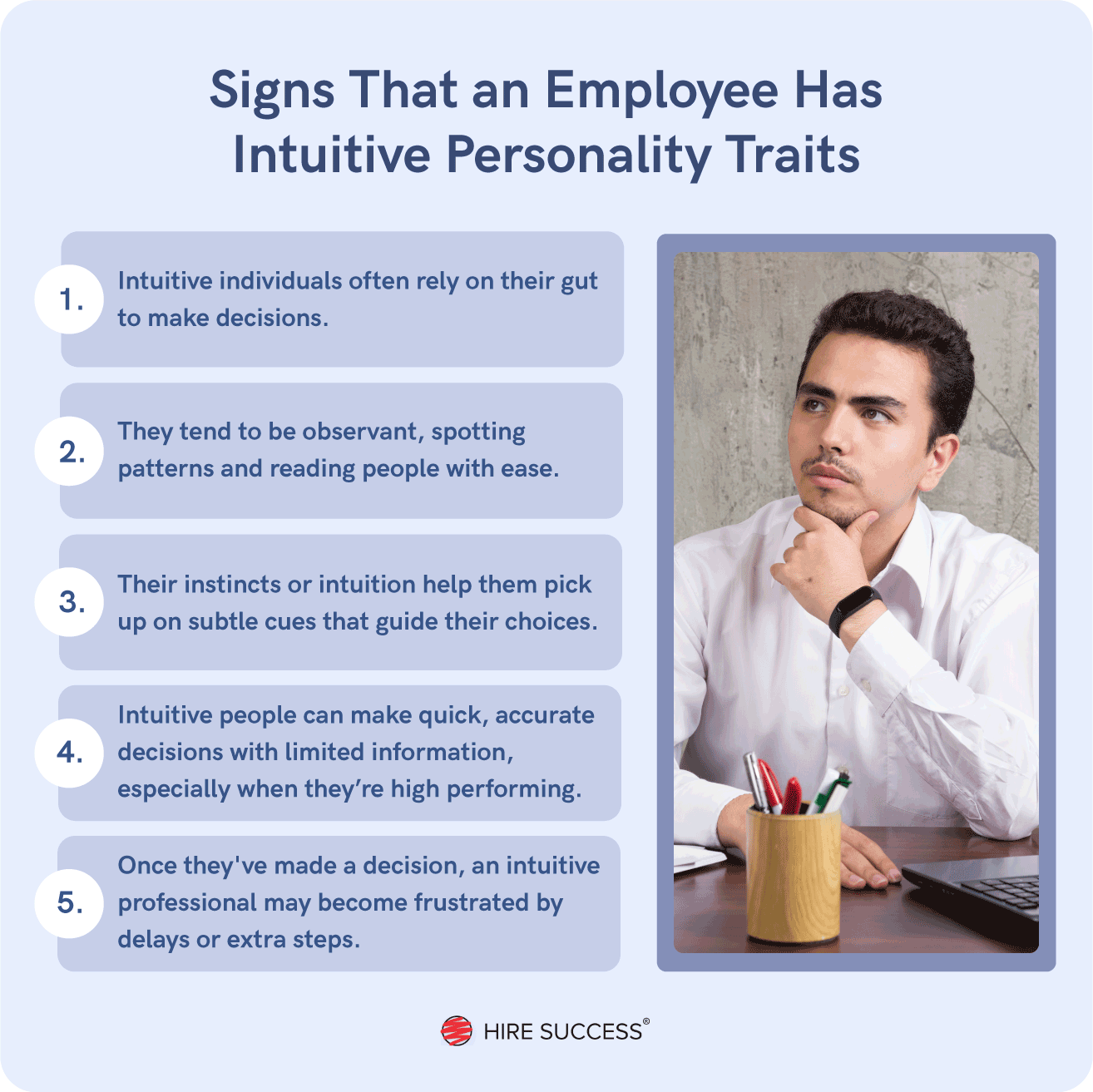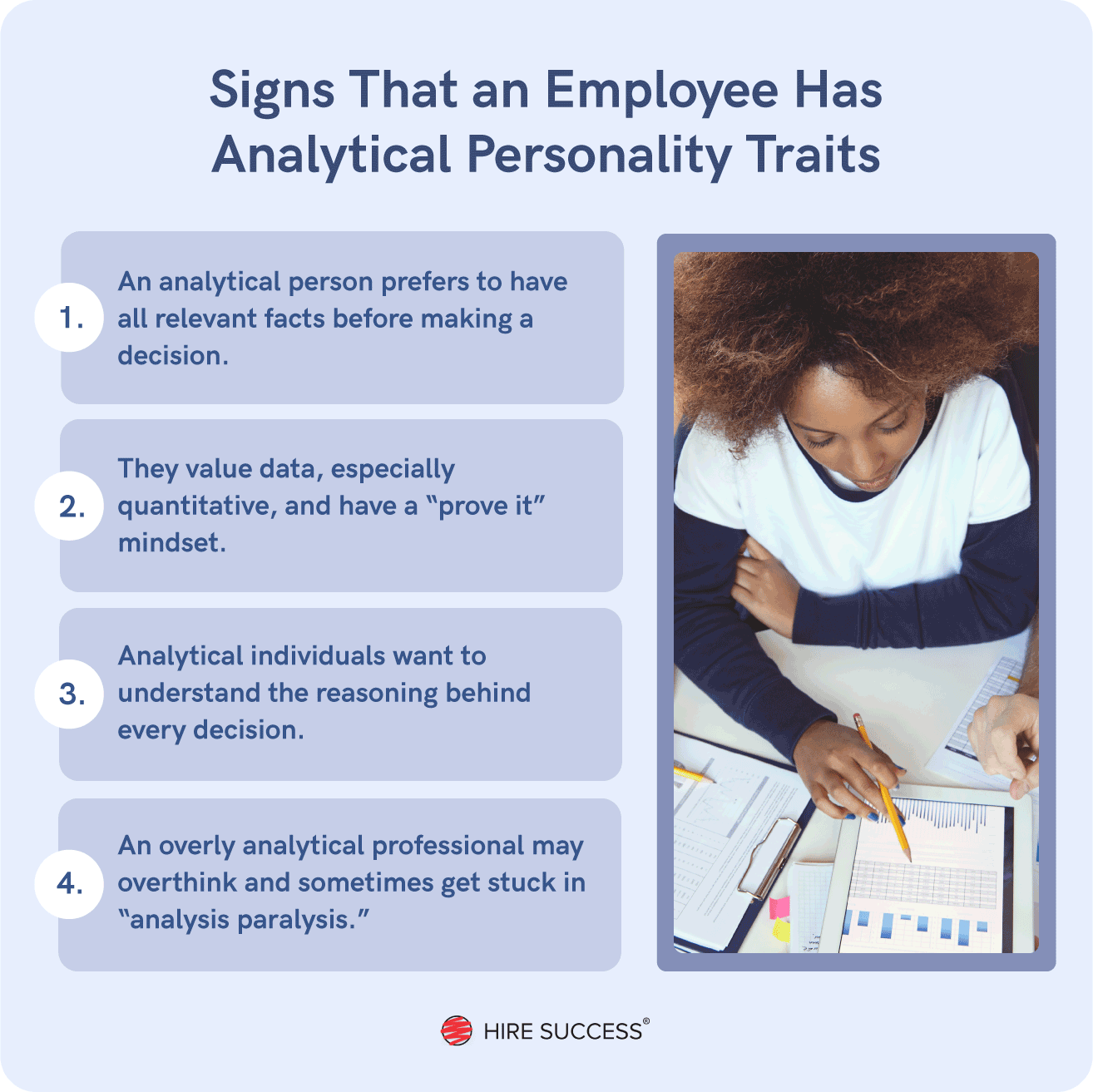Intuitive vs. Analytical Personality Traits
Interviewer's Guide
- Personality Temperament History
- Understanding the 4 Personality Types
- Influence of Secondary Personality Temperament
- Trait Scales Overview
- Defining the Traits
- Personality Profile Reports
- Integrity Test Interviewer's Report
- Skills and Aptitude Test Reports
- Applying the concept of baseline files
- Parity Index
- Management involvement
- Covering the bases - legal aspects to consider

Everyone makes decisions and judgments differently. Within any workplace, you’ll find two different styles of decision-making: intuitive and analytical.
This is just one element of an employee’s workplace personality (read all the personality trait descriptions here), but taken into account with their overall personality type and other traits, it can give you great insight into their work style.
What is an intuitive person?

Simply put, someone with intuitive personality traits makes decisions based on intuition. Rather than formally analyzing a lot of information, the intuitive personality type goes with a gut reaction. High-achieving intuitive employees are often known for making the right call under pressure.
What are the characteristics of someone who is intuitive at work?
Here are a few characteristics of intuitive employees:
- They tend to make decisions and judgments based on their feel of a situation.
- They may not always be able to immediately describe why they’ve come to a certain choice.
- They’re often observant and may be good at spotting patterns, reading people, and picking up on cues that subconsciously influence their decisions.
- Intuitive individuals tend to be very good at making the right decision quickly, without much information, especially if they’re high-performing.
- Once they’ve made up their minds, they may grow frustrated by additional steps or hoops to jump through.
How to work with someone with an intuitive personality
Tapping into the intuition of employees with this trait can help your business succeed and the employee thrive.
How to train someone who is intuitive
The right kind of training will help an intuitive employee’s natural ability to look at the big picture, see patterns and make judgment calls.
- Explain where the employee will be able to make judgment calls and where they need to rely on a procedure or check in with someone else. Of course, the amount of flexibility you have with this will depend on the role and level, but be realistic about where you really can give an employee with good judgment free rein.
How to motivate someone with the intuitive personality trait
A motivated, intuitive employee will make positive contributions to your team. Here is how to inspire and encourage someone who is intuitive:
- All employees are motivated when they feel trusted, but especially those with intuitive traits. As they prove themselves to be trustworthy, give more leeway with decision making.
- Intuitive people may become unmotivated by what they view as unnecessary steps in decision-making processes. Cut down on red tape wherever you can.
- Intuitive individuals tend to push back on second-guessing once they’ve made up their minds. Sometimes, that push-back is necessary; however, if you find the employee is often just waiting for a green light, try to eliminate those blockers.
How to give feedback to an intuitive person
Help intuitive people appreciate a clear, factual, evidence-based approach:
- Ask your intuitive employees to walk you through a recent decision. Doing this occasionally will help give you a sense of their informal process and enable you to give specific feedback.
- Don’t be afraid to point out times when it’s necessary to slow down and double-check information before proceeding. Coach the intuitive person to recognize times when waiting on more information would help, even if it’s not their first instinct.
ChatGPT prompts for a performance review of an intuitive employee
Managers can use AI tools to provide feedback that appeals to the insightful, future-focused, creative mindset that is often present in intuitive people. AI tools can help you frame your feedback in a performance review so that it resonates with their problem solving and out-of-the-box way of thinking.
Sample HR prompt for an intuitive personality:I would like to provide feedback to an employee during their performance review. This employee has an intuitive personality and tends to rely on their feel of a situation, leading to issues with coworkers. They’re very capable in their role, but I’d like to see them grow their soft skills more by being more open to following a process and listening to other people's ideas. Can you share 3-4 sentences about this for their review?
Sample AI-generated response:"You have a strong intuition, which helps you navigate situations effectively, but it’s important to balance that with a more structured approach. At times, relying solely on your instincts has led to challenges in collaboration with others. I encourage you to be more open to following processes and considering the perspectives of your teammates. Developing this balance will help strengthen your relationships and enhance your overall effectiveness in the role."
Sample HR prompts for direct supervisors to help coach an employee with an intuitive personality trait on how to adopt a more structured approach and improve their soft skills at work include:
- How can I encourage an employee who relies on intuition to also adopt a more structured, process-driven approach in their work?
- What are some development goals I can suggest for an intuitive employee to help them improve their teamwork and communication?
- Can you help me write specific, actionable feedback for an employee who needs to be more open to others' ideas and follow processes better?
Good jobs for people with an intuitive personality
Roles in which intuitive people excel are those that involve conceptual thinking and problem solving, and jobs where innovation is valued, such as:
- Creative director
- Therapist
- Artist
- Life coach
- Consultant
- Entrepreneur
- Designer
- Human resources specialist
Intuitive vs. observant
People who are intuitive vs. observant perceive and process information differently. Intuitive people are big-picture, abstract thinkers who are future-focused. Observant people are all about the facts, the details, and the practical present. Intuitive personalities rely on their gut to solve problems in new ways, whereas people who are observant will more often stick to tried-and-true, proven approaches. People who are intuitive are comfortable relying on their insights and instincts when the facts are not clear, while observant personalities want solid data to make solid decisions.
What is the opposite of being intuitive?
The opposite of an intuitive thinker in the workplace is someone with an analytical personality. Rather than relying on a gut reaction, intuitive people will carefully gather information to make a data-based judgment.
What is an analytical person?

An analytical person wants to gather and consider information at length before making a big decision. Even in small choices, they will tend to look to the numbers or data for guidance, rather than making an off-the-cuff choice. The analytical personality trait is often correlated with a Type C personality—see our guide to the 4 Personality Types for more information.
What are the characteristics of someone who is analytical?
Here are a few signs that an employee tends to be analytical:
- They like to have all of the relevant facts before making a decision.
- Analytical personality types value data, especially quantitative data.
- They have a “prove it” mindset and want to hear the underlying reasoning behind decisions.
- In the extreme, they may overthink decisions and get caught in “analysis paralysis,” unable to move forward efficiently.
How to work with someone with an analytical personality
When they’re in their element, analytical employees can bring great data-driven decision making to their teams.
How to train someone who is analytical
For someone who appreciates reasoning, data, and facts, here are some training tips:
- Be sure to explain all of the information sources the person in the role has available. For example, is there historical data from past years available? Who can they call for a second opinion?
- Explaining the reasoning behind your processes helps analytical minds accept them more easily. For example, did you start doing things a certain way because you saw a big reduction in help desk tickets when you did? Is there a correlation between upselling a certain product and higher customer lifetime value?
How to motivate an analytical person
Getting the most from someone who is an analytical thinker requires taking a specific approach:
- Give them time to be analytical. Look for projects and roles where careful, thoughtful decision-making is valuable.
- Give clear direction about how much time and resources you want to allocate toward gathering and analyzing information. If you know your employee will naturally dive deep, be clear about when it’s needed—and when it isn’t.
How to give feedback to an analytical employee
Keeping it real works for analytical employees, as does providing guidance that keeps them moving forward in a timely manner and avoiding being overly analytical:
- Offer information and data to back up your feedback. Your praise and constructive criticism will both carry more weight with an analytical employee if you tie it to real, meaningful performance data.
- Be clear if over-analyzing is a problem. For example, if “analysis paralysis” is leading to missed deadlines or a slower pace of work than the role demands, explain that things need to move more quickly. Ask coaching questions like “If we’re on a tight deadline, how can you move forward sooner, even if you don’t feel you have 100% of the information you’d like to have?”
ChatGPT prompts for a performance review of an analytical employee
Using AI tools can help HR professionals give feedback to analytical employees in ways that are relevant to their mindset. When you take the right angle, you can really connect during a performance review. Analytical people will more readily take your feedback on board and use it productively if you tailor it to their personality type using AI.
Sample HR prompt for an analytical personality:I would like to provide feedback to an employee during their performance review. This employee has an analytical personality and tends to over-analyze problems, leading to missed deadlines. They’re very capable in their role as a full stack developer, but I’d like to see them grow their decision-making skills by being more proactive. Can you share 3-4 sentences about this for their review?
Sample AI-generated response:“You have a strong analytical mindset, which allows you to approach problems thoroughly and deliver high-quality solutions. However, at times, this tendency to overanalyze can delay decision making and impact deadlines. I encourage you to trust your expertise and be more proactive in making timely decisions, even when all the details aren’t fully available. Strengthening your decision-making skills will enhance your productivity and further your effectiveness as a developer.”
Sample HR prompts for direct supervisors to help coach an employee with an analytical personality on how to improve their decision-making and communication skills at work include:
- How can I encourage an analytical employee to be more proactive in their decision-making process?
- What feedback can I give an analytical employee to improve how they collaborate with others, especially when their analytical nature slows team progress?
- What feedback can I provide to help an analytical employee manage their time more effectively and avoid getting stuck in details?
Good jobs for analytical thinkers
The best roles for logical, data-driven problem solvers include jobs such as:
- Software developer
- Financial analyst
- Data scientist
- Business analyst
- Statistician
- Engineer
- Administrative assistant
- Quality assurance analyst
Which is a better worker: intuitive vs. analytical?
Intuitive and analytical thinkers bring different strengths and many teams benefit from a mix of people with different degrees of intuitive and analytical styles.
Analytical employees bring a data-driven viewpoint and thorough decision making to the table. Being the opposite of analytical thinking, the intuitive personality trait can be a huge bonus in fast-paced environments and people-facing positions.